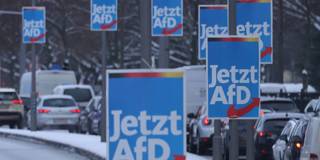Since the end of the Cold War, Germans were spared from having to decide between competing visions of their country’s role in Europe, NATO, and the wider world. But with the rapid rise of radical parties advocating reckless domestic and foreign policies, the choice confronting voters this year could not be more consequential.
BERLIN – For years, German foreign policy was rarely a domain of fierce debate over fundamentally different alternatives. Since reunification (1989-91), Europe’s largest country and strongest economy has defined its foreign policy in terms of European and transatlantic relations, implying ever-deeper anchoring within the European Union and NATO. In practice, this meant outsourcing German security to the transatlantic alliance, disinvesting militarily, and concentrating on boosting the country’s economic power.
Postwar Germany’s highest priority has been to forge compromises with fellow Europeans, both deepening and enlarging the EU, which German leaders have seen as the single most important contribution the country can make to peace and prosperity on the continent. Not only is the goal of a stronger EU formally enshrined in Germany’s Basic Law, but the country’s economic model relies heavily on European integration and global market access. That reliance has only increased now that cheap energy from Russia no longer underpins the economy’s competitiveness.
But Germany’s party system is changing ahead of this spring’s European Parliament elections. Newer, radical parties are openly challenging the postwar consensus. Indeed, the far-right Alternative für Deutschland (AfD) is promoting an exit from the EU, an end to support for Ukraine and sanctions against Russia, and a reversal of the country’s decarbonization policies.

BERLIN – For years, German foreign policy was rarely a domain of fierce debate over fundamentally different alternatives. Since reunification (1989-91), Europe’s largest country and strongest economy has defined its foreign policy in terms of European and transatlantic relations, implying ever-deeper anchoring within the European Union and NATO. In practice, this meant outsourcing German security to the transatlantic alliance, disinvesting militarily, and concentrating on boosting the country’s economic power.
Postwar Germany’s highest priority has been to forge compromises with fellow Europeans, both deepening and enlarging the EU, which German leaders have seen as the single most important contribution the country can make to peace and prosperity on the continent. Not only is the goal of a stronger EU formally enshrined in Germany’s Basic Law, but the country’s economic model relies heavily on European integration and global market access. That reliance has only increased now that cheap energy from Russia no longer underpins the economy’s competitiveness.
But Germany’s party system is changing ahead of this spring’s European Parliament elections. Newer, radical parties are openly challenging the postwar consensus. Indeed, the far-right Alternative für Deutschland (AfD) is promoting an exit from the EU, an end to support for Ukraine and sanctions against Russia, and a reversal of the country’s decarbonization policies.